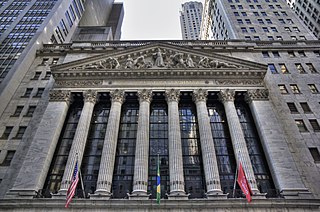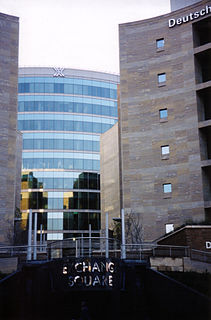
A stock exchange, securities exchange, or bourse is an exchange where stockbrokers and traders can buy and sell securities, such as shares of stock, bonds and other financial instruments. Stock exchanges may also provide facilities for the issue and redemption of such securities and instruments and capital events including the payment of income and dividends. Securities traded on a stock exchange include stock issued by listed companies, unit trusts, derivatives, pooled investment products and bonds. Stock exchanges often function as "continuous auction" markets with buyers and sellers consummating transactions via open outcry at a central location such as the floor of the exchange or by using an electronic trading platform.

A financial market is a market in which people trade financial securities and derivatives at low transaction costs. Some of the securities include stocks and bonds, raw materials and precious metals, which are known in the financial markets as commodities.

A security is a tradable financial asset. The term commonly refers to any form of financial instrument, but its legal definition varies by jurisdiction. In some countries and languages people commonly use the term "security" to refer to any form of financial instrument, even though the underlying legal and regulatory regime may not have such a broad definition. In some jurisdictions the term specifically excludes financial instruments other than equities and Fixed income instruments. In some jurisdictions it includes some instruments that are close to equities and fixed income, e.g., equity warrants.

Australian Securities Exchange Ltd or ASX, is an Australian public company that operates Australia's primary securities exchange, the Australian Securities Exchange. The ASX was formed on 1 April 1987, through incorporation under legislation of the Australian Parliament as an amalgamation of the six state securities exchanges, and merged with the Sydney Futures Exchange in 2006.
A real estate investment trust (REIT) is a company that owns, and in most cases operates, income-producing real estate. REITs own many types of commercial real estate, including office and apartment buildings, warehouses, hospitals, shopping centers, hotels and commercial forests. Some REITs engage in financing real estate.
An exchange-traded fund (ETF) is a type of investment fund and exchange-traded product, i.e. they are traded on stock exchanges. ETFs are similar in many ways to mutual funds, except that ETFs are bought and sold from other owners throughout the day on stock exchanges whereas mutual funds are bought and sold from the issuer based on their price at day's end. An ETF holds assets such as stocks, bonds, currencies, futures contracts, and/or commodities such as gold bars, and generally operates with an arbitrage mechanism designed to keep it trading close to its net asset value, although deviations can occasionally occur. Most ETFs are index funds: that is, they hold the same securities in the same proportions as a certain stock market index or bond market index. The most popular ETFs in the U.S. replicate the S&P 500, the total market index, the NASDAQ-100 index, the price of gold, the "growth" stocks in the Russell 1000 Index, or the index of the largest technology companies. With the exception of non-transparent actively managed ETFs, in most cases, the list of stocks that each ETF owns, as well as their weightings, is posted daily on the website of the issuer. The largest ETFs have annual fees of 0.03% of the amount invested, or even lower, although specialty ETFs can have annual fees well in excess of 1% of the amount invested. These fees are paid to the ETF issuer out of dividends received from the underlying holdings or from selling assets.

The Securities Exchange Act of 1934 is a law governing the secondary trading of securities in the United States of America. A landmark of wide-ranging legislation, the Act of '34 and related statutes form the basis of regulation of the financial markets and their participants in the United States. The 1934 Act also established the Securities and Exchange Commission (SEC), the agency primarily responsible for enforcement of United States federal securities law.

JSE Limited is the largest stock exchange in Africa. It is located in Sandton, Johannesburg, South Africa, after it moved from downtown Johannesburg in 2000. In 2003 the JSE had an estimated 473 listed companies and a market capitalisation of US$182.6 billion, as well as an average monthly traded value of US$6.399 billion. As of March 2022, the market capitalisation of the JSE was at US$1.36 trillion.

Security market is a component of the wider financial market where securities can be bought and sold between subjects of the economy, on the basis of demand and supply. Security markets encompasses stock markets, bond markets and derivatives markets where prices can be determined and participants both professional and non professional can meet.

The bond market is a financial market where participants can issue new debt, known as the primary market, or buy and sell debt securities, known as the secondary market.This is usually in the form of bonds, but it may include notes, bills, and so on for public and private expenditures. The bond market has largely been dominated by the United States, which accounts for about 39% of the market. As of 2021, the size of the bond market is estimated to be at $119 trillion worldwide and $46 trillion for the US market, according to Securities Industry and Financial Markets Association (SIFMA).
Nasdaq Dubai is a Dubai-based stock exchange that lists regional and international shares in the Middle East. Through the exchange, regional issuers can access regional and international investment. International issuers can access investment from the region, through a primary or dual listing.

Hong Kong Exchanges and Clearing Limited operates a range of equity, commodity, fixed income and currency markets through its wholly owned subsidiaries The Stock Exchange of Hong Kong Limited (SEHK), Hong Kong Futures Exchange Limited (HKFE) and London Metal Exchange (LME).
The South African Futures Exchange (Safex) is the futures exchange subsidiary of JSE Limited, the Johannesburg-based exchange. It consists of two divisions; a financial markets division for trading of equity derivatives and an agricultural markets division (AMD) for trading of agricultural derivatives.

The Jamaica Stock Exchange is the principal stock exchange of Jamaica, also known as JSE. Incorporated in 1968, JSE opened in 1969 in Kingston, Jamaica. Today, the JSE is one of the largest stock exchanges in the Caribbean by size and market capitalization. As of September 30, 2019, there is a total number of 85 companies and 120 securities listed to the JSE, and a market capitalization of just over JM$2 trillion. The Jamaica Stock Exchange is composed of multiple markets: Main Market, Junior Market, USD Market, and Bond Market. The JSE is also recognized as one of the most sector-diverse exchanges in the Caribbean. The key sectors include banking and finance, retail, manufacturing, insurance, leisure, communications, conglomerate, and services and real estate. The current chairman is Ian McNaughton and the deputy chairman is Gary Peart. The managing director is Marlene Street Forrest.
A multilateral trading facility (MTF) is a European Union regulatory term for a self-regulated financial trading venue. These are alternatives to the traditional stock exchanges where a market is made in securities, typically using electronic systems. The concept was introduced within the Markets in Financial Instruments Directive (MiFID), a European Directive designed to harmonise retail investors protection and allow investment firms to provide services throughout the EU.

Nasdaq Private Market (NPM) provides a secondary market trading venue for issuers, brokers, shareholders, and prospective investors of private company stock. Since inception, NPM has facilitated more than $40 billion in transactional volume and has worked with 400+ private companies and 100,000+ employees, stakeholders, and investors. NPM offers private company and investors different solutions including tender offers, auctions, block trades, and custom company marketplaces. In 2021, NPM spun-off of Nasdaq to become its own, independent company receiving strategic investments from Silicon Valley Bank, Citi, Goldman Sachs, Morgan Stanley, and Allen and Co.
Net 1 UEPS Technologies is a publicly-traded South-African financial technology company that is listed on the NASDAQ and Johannesburg Stock Exchange. The company has managed South Africa's social grant payment system and is headquartered in Johannesburg. By July 2012, Net1 had issued more than 2.5 million South African Social Security Agency (SASSA) debit MasterCards to social grant recipients in the country.











